|
KYLE JARROW
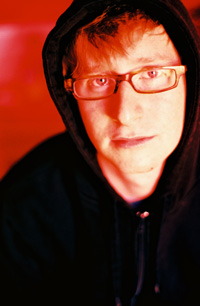
This
edition we spotlight KYLE JARROW, the
OBIE-award winning playwright/composer and co-founder of The Fabulous
Entourage, the truly fabulous New York City party band. "TFE" is
on sabbatical at the moment, as co-front girl Libby Winters goes off to
star in the Abba hit-fest "Mama Mia" in Las Vegas, where she has
landed a lead role. TFE is Kyle's baby, but he's got plenty to keep him busy
over the break: the September premiere of his musical "Love Kills," a
re-telling of the Charlie Starkweather/Caril Ann Fugate murders that riveted the
nation in 1957-58; and a 2008 premiere of the musical he is writing with
hit-maker Duncan Shiek. And that's not all. Represented by the powerful Creative
Artists Agency (CAA), Kyle is also staying busy with television and film
projects, and his involvement with Ars Nova's writer's workshop The Play Group
helps keep him at the cutting edge of NYC off-Broadway.
After
graduating from Yale, with a degree in Religious Studies, Kyle moved to The City
on September 9, 2001. Two days later America, and particularly New York
City, was changed by the destruction of the World Trade Center towers. Kyle's
entire residency in the Big Apple has been lived in the shadow of that moment in
history, which remains an intensely localized event. Other than the Pentagon, a
natural target, no other civilian population felt the impact of 9-11 the way New
Yorkers did. No one else experienced, in the visceral way New Yorkers did, those
moments in which the horizon was altered, when the mightiest of edifices, in a
range of steel and concrete that humbles the sturdiest among us, crumbled.
Sustaining,
even thriving in that post apocalyptic stew of paranoia, patriotism,
introspection, disillusionment, pride, resoluteness and fear, Kyle has fashioned
an artistic statement of shock and awe and unmitigated goodness that roars from
the halls with a joyous sound, and rings to the rafters with the promise of a
modern theatre.
KYLE
JARROW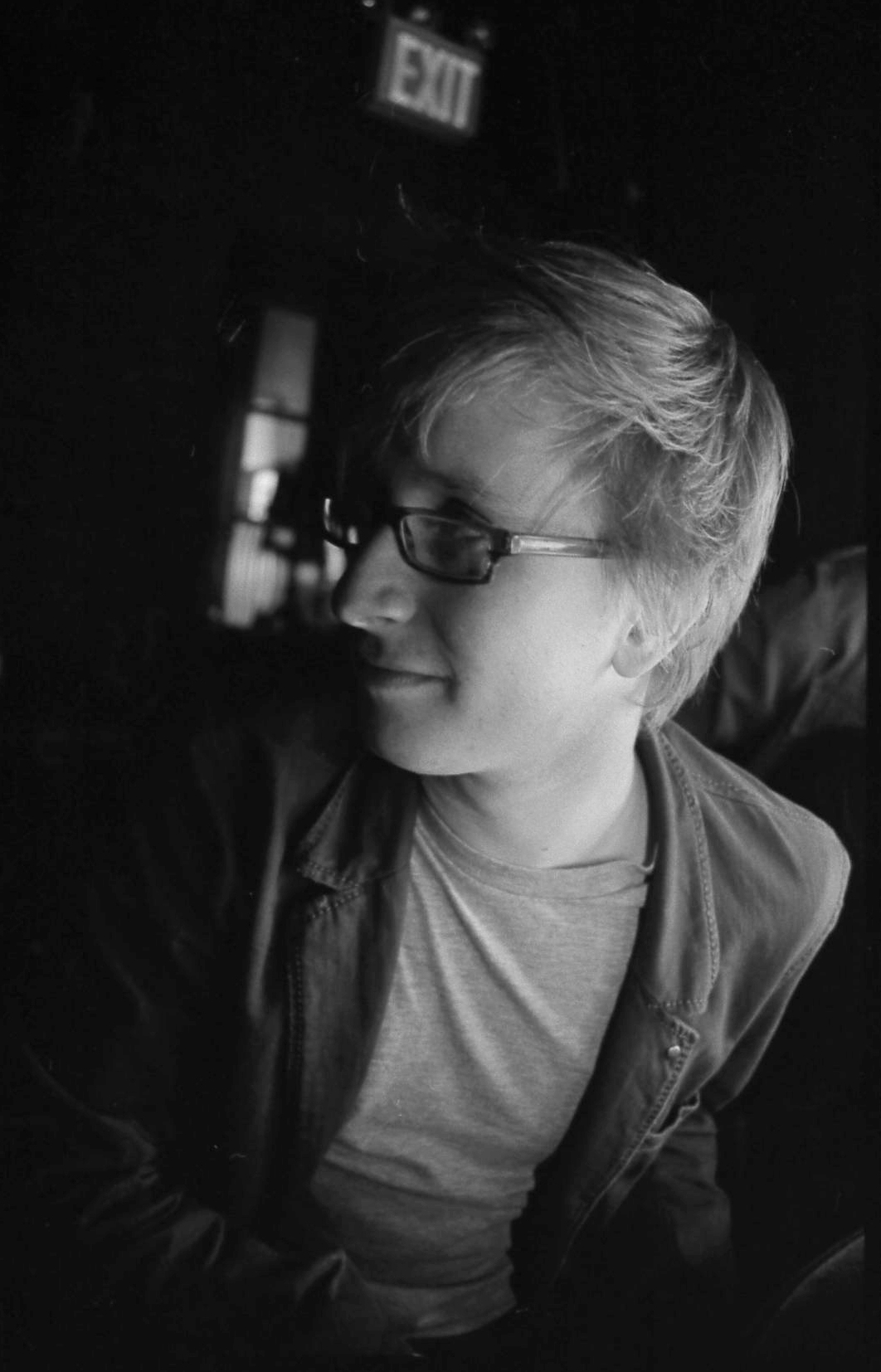
by
RAR
In
2004, Kyle Jarrow won an OBIE Award, off-Broadway's equivalent of a Tony, for
his exploration into Scientology, "The Very
Merry Unauthorized Childrens Scientology Pageant." Featuring Kyle's
original compositions, the play uses Scientology's actual teachings to poke
humor at this most controversial of modern religions. The play has become
an annual event in New York City, playing to appreciative audiences who love its
blend of laugh out loud satire and deeply sensitive musical introspection.
Kyle's
Scientology satire was wrapped around a tour of dark humors that personifies his work. His
"Gorilla Man" examined, in a musical way, the turmoil of a family
whose patriarch is revealed to have the DNA of an ape. There is the
psychosexual "private dick" tale "Rip Me Open," with all of
its gender confusion, and "fuckplays," which is about as it sounds.
And there is "Armless," about a man with Body Integrity Identity
Disorder whose desire is to cut off his arms.
Trolling
such weird waters, I wondered what Kyle's worldview actually is...
Your
plays seem to me to be characterized by a generally bleak view of human nature,
an acid satire, and surreal absurdity. First off, did I get any of that right?
Sure!
I do have a generally bleak view of human nature, and there's a satirical and
surrealist edge to much of my writing. I try to throw in a bunch of humor as
well, to make the pill a little easier to swallow.
It
makes me wonder what theatre can be, to your mind. Are you on a mission to
reveal the world in all its weirdness? Or change it? What are we missing as a
species that you might inject into us through your work?
We
all live busy lives, full of complexity and complication. We often don't have
the time or the inclination to think critically about the way we live or the
choices we make. But when we sit down in a theater, or in front of a movie
screen, or at a rock concert-we're stepping outside of our lives, if only for
a little while. That makes it the perfect time to reflect, and to ask the
questions that we might not otherwise ask ourselves. Questions about why we
live the way we do, why the world is the way it is, and if and how those
things should change. That's why I write: I like making people confront these
questions.
Your
website is called "Land of Trust," which just sounds sarcastic.
Anything behind that name?
One
night about a year and a half ago I was out at dinner with a couple of
friends, and we were talking about another friend who had done something
fairly shady. My friend Brian said, "He needs to come back to the land of
trust." I thought that was one of the funniest things I'd ever heard. So
a few months later, when I started a website, I called it The Land of Trust.
I've also written a song for my band, The Fabulous Entourage, called this.
There's no deeper meaning, really: I just think it's an amusing phrase.
Where
are you from? How did you get from there to here (Brooklyn)?
I
grew up in Ithaca, NY, and lived there until I went off to college at
seventeen. My family did travel a lot when I was child (my dad is a college
professor), which took us to Australia, Finland, Russia, and England. Those
early-life travel experiences definitely helped shape who I am today. Anyway,
at age 17 I went off to college, lived for four years in Connecticut, then
moved to NYC after graduation. I arrived in New York on September 9, 2001,
which as you can imagine was just about the worst possible time to move there.
I thought about leaving after 9/11, but decided to stick it out. That first
year in the city was rocky, to say the least, but it got better and I'm very
glad I stayed.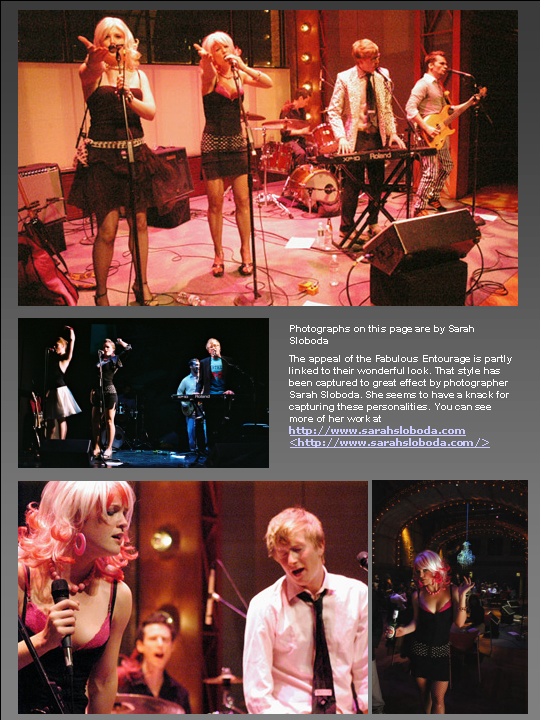
You have a degree in religious studies from Yale, something you turned to after
first studying political science. That strikes me as a shift from the corporeal
to the metaphysical. Was there some parallel shift in the worldview of young
Kyle Jarrow around that time? Or was it a matter of you finding your natural
plane?
Wow,
I like that analysis. I love it when interviewers offer a way of thinking about
my life that never occurred to me. It makes me sound a lot smarter than I really
am. I think you're right: young Kyle Jarrow arrived at Yale wanting to focus on
more "practical" fields, and in the course of his freshman year came
to be interested in more abstract metaphysical concerns. Somehow, the latter
just started seeming more important.
To those of us looking in on your life, it seems like something anyone would
wish for himself or herself. You have had early success. Do you recall some
point at which things kind of took off for you? What did that feel like? Is
there a sense of excitement that is still with you?
Well,
that's very kind of you to say. There have been some great moments: first NY
Times review, winning an OBIE Award, getting my first TV deal, having a
caricature of the band in The New Yorker. As great as all those sorts of things
are, the thing that keeps it exciting for me - I know this'll sound cheesy, but
it's true - is the constant quest to write well, to figure out how to express a
story or a theme most effectively. Every project has its own set of riddles and
challenges. Facing those is what keeps things interesting for me.
Do you feel a sense of momentum right now? Like you can do no wrong? Or do you
feel pressure to top yourself?
I
definitely feel a pressure to do better and better work, to keep improving. Most
of this pressure is self-imposed. But I think it's important-without that, I
would get lazy.
Do you look at your career as having an arc and, if so, what is at its highest
point? What is your fondest wish for your career?
These
are some tough questions. I guess the truth is I don't really think about this.
I try to take every day as it comes, and every project on its own terms. There
are high points and low points, sure, but it can be dangerous to concentrate too
much on that.
Do you feel fated in any way? Is what is happening for you just an extension of
what you always knew would happen for you?
Wow,
this one is deep. The answer is no; I don't feel fated in the least. I mean, I'm
a writer; it's not the most profound of professions. If I were saving starving
children or leading a nation, that might feel like a fated existence. This, not
so much.
What is your musical training? When did music start for you? How does a poli-sci/religious
studies major become a musician?
I
started taking piano lessons when I was in second grade, and I played trumpet in
high school. I was also in the high school choir and the madrigal group, which
is just as dorky as it sounds. Music's always been an important part of my life.
One of the most fun things in the world for me is to sit at a piano and just
futz around, coming up with melodies and parts of songs. I can do that for
hours.
How did the Fabulous Entourage come together? And will they ever come together
again? Do you have any long-term vision for the act?
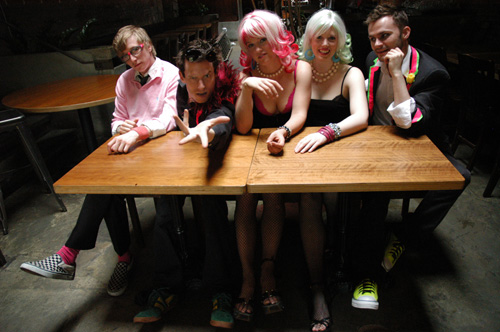 The
Fabulous Entourage began as a collaboration between Travis Chamberlain
(bassist/vocalist in the band) and me. At first, it was just the two of us,
performing with a drum machine. Over time, we added a drummer (Perry Silver) and
female vocalists (the current lineup being Libby Winters and Pamela Quinn). At
the moment, we're on a six-month hiatus because Libby booked the leading role in
Mamma Mia in Las Vegas. We plan to reconvene after that, however. People can go
to our website at http://www.fabulousentourage.com to find out details on that. The
Fabulous Entourage began as a collaboration between Travis Chamberlain
(bassist/vocalist in the band) and me. At first, it was just the two of us,
performing with a drum machine. Over time, we added a drummer (Perry Silver) and
female vocalists (the current lineup being Libby Winters and Pamela Quinn). At
the moment, we're on a six-month hiatus because Libby booked the leading role in
Mamma Mia in Las Vegas. We plan to reconvene after that, however. People can go
to our website at http://www.fabulousentourage.com to find out details on that.
I read where your fondest dream, at one time, was to tour the Entourage and make
records - become a rock star. Is that still true?
I
love playing music live, and I love recording with The Fabulous Entourage. Being
able to do that full-time would be an extremely fun life. Is that still my
fondest dream? I'm not sure. I'm not really sure what my fondest dream would be,
at this point. My life seems to be going pretty well at the moment; I'm cool
with riding it out, seeing where it leads.
Might Kyle Jarrow ever become a solo act? A front guy?
I
haven't thought about it much, though who ever knows what the future will hold.
Really, I don't think of myself as a performer so much as a composer; that's
more my focus.
The Fabulous Entourage is a lot of fun and you sound great. I love your energy
and attitude. Is the Fabulous Entourage an embodiment, in any way, of your
personal philosophy? Of any themes running through your work? I'm not completely
sure what your "position" is in the band? Do you have any control over
its direction?
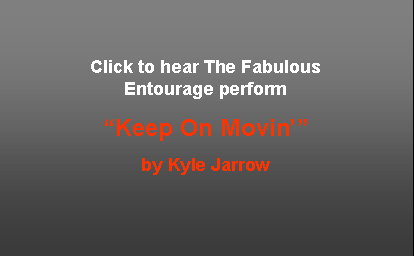 Thanks
for the compliments. We have fun doing it; I'm glad that comes across. I write
most of the songs for the band and play keyboard and sing, bassist Travis
Chamberlain writes the rest and we all arrange them together. There are four
vocalists in the band, which is a lot of what makes our sound distinct I think.
As for the themes that run through the songs… a review on the website
uncoolkids.com wrote about us: Thanks
for the compliments. We have fun doing it; I'm glad that comes across. I write
most of the songs for the band and play keyboard and sing, bassist Travis
Chamberlain writes the rest and we all arrange them together. There are four
vocalists in the band, which is a lot of what makes our sound distinct I think.
As for the themes that run through the songs… a review on the website
uncoolkids.com wrote about us:
"Woe
would be the best word for the The Fabulous Entourage's general demeanor. Woe to
this sad, painful life of unrequited love! Woe to this world of want and desire
and war, but of course, beneath it all, is a deep satisfaction that if we have
to face a world of anguish and desolation, you'd better BELIEVE that we're going
to look good while we do it!"
I'd say that's a pretty good summation of the themes of our music, as well as my
own personal worldview.
Going back to your plays, I envy that you have had success exploring the kinds
of off kilter subject matter - people who wish to be without their arms,
Scientologists, gorilla DNA and how it affects families - that seem the province
of the young and the reckless. Can you imagine your future explorations taking
the usual track of maturity, i.e., compressing into more cautious spaces?
Otherwise, becoming more standard explorations of humanity?
That's
a good question. I am pretty young and reckless, I won't dispute that. I'm sure
the subject matter that interests me will change as I age. Whether or not it'll
get more "cautious," who knows. Let's hope not.
Whose theatre work do you admire?
I'm
a big fan of the plays of Sam Shepard, Mac Wellman, Richard Maxwell, Sander
Hicks… when it comes to musicals, I like "Hedwig," "Spring
Awakening," and "Avenue Q" as well. From folks in my peer group,
there's a lot of great writing being done. I've lately been really digging the
plays of The Debate Society, Young Jean Lee, and Clay McLeod Chapman.
You must be a highly social creature? Is that right? I say this because you have
the highly social party band, and you are associated with groups like Play
Group.
I
guess I'm pretty social guy. New York's a great city for going out, and I try to
take advantage of that.
Do you maintain a group of close friends? Are the members of the Fabulous
Entourage close off stage?
The
answer to both these questions is yes. In a big city like NYC, it's important to
have a close group of friends. It keeps you grounded, keeps you from feeling
lost in the shuffle. The members of TFE are some of my closest.
Do I get this right that Play Group members meet regularly to read their work
and get feedback? Do you enjoy that process? Do you value feedback or consider
it just part of the hardening of your writer skin?
The
Play Group is a writer's workshop run by Ars Nova, an arts organization in NYC's
Hell's Kitchen neighborhood. There are a lot of very talented writers in the
group, so it's definitely helpful - and always interesting - to hear what
they're working on and to get their thoughts on my writing. I've found that
getting feedback, learning which notes to accept and which to ignore, and then
knowing what to do with them, is one of the more important skills for a writer.
How do people generally respond to your ideas, some of which are pretty
"wild?" Or, is there some insulation in working in those
little-visited realms? Is it safer, in your world, to work in
"outside" themes?
Some
of my ideas are a little off-center, it's true. People cutting off their arms,
turning into gorillas, teenage serial killers -- to name a few. I guess that's
just the subject matter I'm drawn to. I find that people are more willing than
you might guess to accept wild and/or dark stories, as long as they're rooted in
an emotional reality. I have, however, gotten some funny responses to ideas
before. One friend, after hearing a concept for a new play of mine, just looked
at me straight-faced and said "you're kidding, right?"
You probably don't categorize yourself as "writer,"
"playwright," "composer," "musician," etc., do
you? Or do you think of yourself as essentially one of those, but with branches?
Hmmm,
I haven't thought about this much. I guess I see myself as a writer, with
"playwright," "screenwriter," "TV writer," and
"composer" as various branches of that.
You are represented by Creative Artists Agency (CAA), is that right? Did they
come knocking, or how did that work?
I
worked on a TV project a couple years ago with my friend Stephen Tolkin (a truly
awesome writer). He's represented by CAA and he introduced me to the team there,
which turned out to be a good match.
Is there a focus to CAA's representation of your work? Are they, for instance,
all about movie and television? What's going on on those fronts for you?
CAA
represents me on all fronts - film, television, and theater. They've been
especially helpful in connecting me to great film and television projects, which
are pretty much how I make a living these days. I feel very lucky to get to work
with them.
Where are you at with your work about Charlie Starkweather and Caril Fugate?
There is a lot to find compelling about that story, but what does it for you?
What about the story moves you?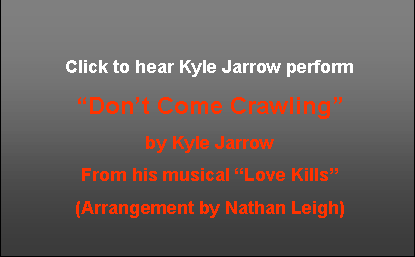
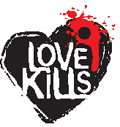 I've
written a rock musical called LOVE KILLS about 1950s teenage spree killers
Charlie Starkweather and Caril Fugate. It's going to premiere in NYC this
September, directed by Jason Southerland. I'm very excited about it and I hope
that anyone reading this in NYC will go check it out. (You can see more info
online at http://www.lovekillsthemusical.com) What I find most compelling about
this story is the opportunity it allows to explore the changing nature of love.
Is the intensity of young love a good thing, or an unhealthy thing? When love
becomes calmer with time and age, is that a natural maturation or a kind of
loss? The play examines these issues… and it has a bunch of balls-out emo rock
numbers to boot. I've
written a rock musical called LOVE KILLS about 1950s teenage spree killers
Charlie Starkweather and Caril Fugate. It's going to premiere in NYC this
September, directed by Jason Southerland. I'm very excited about it and I hope
that anyone reading this in NYC will go check it out. (You can see more info
online at http://www.lovekillsthemusical.com) What I find most compelling about
this story is the opportunity it allows to explore the changing nature of love.
Is the intensity of young love a good thing, or an unhealthy thing? When love
becomes calmer with time and age, is that a natural maturation or a kind of
loss? The play examines these issues… and it has a bunch of balls-out emo rock
numbers to boot.
You have been working with
Duncan Sheik. How did that come to pass? How do you
work together?
Duncan
is a massively talented guy, and I'm privileged to be writing the book for a
musical called WHISPER HOUSE for which he's writing songs. It tells the story of
a young boy who is sent to live in a haunted lighthouse during World War II.
It's a creepy, and hopefully poignant, show. It'll premiere at Stamford Center
for the Arts in Fall 2008, directed by the very talented Keith Powell (who
brought Duncan and I together, as he's friends with both of us). A little bit of
interesting trivia: Keith also plays the role of Twofer on "30 Rock."
Are you generally of a collaborative nature?
I
try to be. Definitely the band is a very collaborative venture. When it comes to
theater projects, I used to write alone but recently I've been trying to
collaborate more. I'm doing the Duncan Sheik thing, and I'm also writing the
book for a musical with songs by Damon Intrabartolo (who wrote the show
"bare"). I'm writing songs for plays by Clay McLeod Chapman, Liz
Meriwether, and Steve Yockey. I'm developing a film adaptation of my play
"Armless" with director Habib Azar, and making a synth pop album with
songwriter and producer Nick Szydlowski. Each collaboration functions a little
differently, which keeps things interesting. And for someone like me, with
borderline ADD, keeping things interesting is very important.
Is there a Kyle Jarrow playbook someplace, a compendium, if only in your mind,
of how people should live? Do you have a vision for "our" future? What
should it look like? What will we be doing in a perfect world that we are not
doing now? Will we ever get there?
Here's
what I think: life is tough, and there's a lot of suffering in it, no matter who
you are. Do what you can to ease other people's suffering, be as kind as you can
as much as you can, and make sure that the people you love know how much you
love them. Amen.
Do you think of yourself as a philosopher?
Only
on rare occasions, late at night, when I've had way too many drinks. Or, I
guess, when answering the question above.
I went through a period, when I was about your age, where I felt that my
creative powers were at a high point, and I felt the same about the clarity of
my insight into the world's complexities. Do you feel pretty clear in your mind
about life right now? Is it easy for you to separate the "rights" from
the "wrongs?" Or do such exist to your mind?
I
feel pretty lost among the world's complexities, to be honest. My perspective is
constantly shifting. In the course of my writing, I struggle with the questions
I'm asking myself about how I should live. I find it's most productive to write
from a place of questioning, as opposed to a place of trying to advocate an
approach to life. Asking questions, and prompting an audience to ask them too,
is what good art does.
What is it like to be living in New York City at this time in your life? Can you
imagine living anywhere else? What about it might make it your home forever?
I
love NYC. It's really like nowhere else on Earth. I know everyone says that, but
it's true. New York gets in your blood, like a sickness - but a kind of a great
sickness. I think about living other places; sure. I have to go to Los Angeles a
lot for work and am often tempted to move there, perhaps I will at some point.
Beaches and palm trees are seductive. But at the moment, New York has me hooked.
What are you not doing at this time in your life that makes you feel you might
be missing something?
I'd
like to travel more. I love traveling, internationally especially, and haven't
done this nearly as much I'd like to. Someday, I hope to split my time between
the U.S. and a foreign country, maybe Argentina or Turkey (two of my favorite
places). Pipe dream? Realistic goal? Only time will tell…
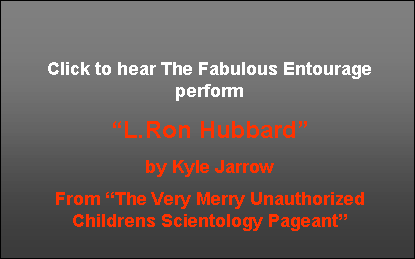 As a religious studies scholar, do you have a problem with Scientology? Is there
anything, to your mind, that gives greater credence to one religion over
another? Or should we just can them all? As a religious studies scholar, do you have a problem with Scientology? Is there
anything, to your mind, that gives greater credence to one religion over
another? Or should we just can them all?
The
Church of Scientology tends to be a litigious organization, so I have to be
careful what I say on this point. My play "A Very Merry Unauthorized
Children's Scientology Pageant" pretty much lays out how I feel about the
Church-I understand the appeal of its teachings, but I have problems with the
way the institution is run. The truth is, I feel similarly about a lot of
religious organizations. In terms of what they provide for an individual,
there's a real value. But institutionally, there are often endemic problems.
However, despite this, I would never advocate canning all religion. I'm no
Christopher Hitchens. Religious faith is an important part of many people's
lives. Just not, at this juncture, mine.
Tell me about the role that "shock" plays in your theatre work?
Shock
rocks. It's a powerful tool. It elicits a visceral response, gets you reacting
not only with your brain but with the rest of your body too. I think theater
could use more of that, so I try to deploy shock as a tool as much as I can, to
grab the audience's attention and give them a jolt that will involve them more
completely in the world of the play.
How does your family respond to your work?
I
think they were a little skeptical at first-my mother's a children's book
writer, so she knows that the life of a writer can be a tough one. But they've
been very supportive, especially in the past couple years. These days, I even
bounce new ideas off my mother sometimes. She always offers a good perspective.
I was reading an interview on line that you did a couple years ago in which you
were talking about how painful it is to seek funding for your projects. Does
money continue to be a difficult issue? Has that gotten better?
Early
in my career, I was involved as a producer with several of my theater projects.
I don't regret the experience, but it was always exhausting to look for funding.
Recently, I've been lucky enough to have some people passionate enough about my
work to raise money for it, and I haven't had to serve in that role. However,
it's not easy for them, either - theater can be a risky investment, no matter
how you slice it. But I do think it's an important medium, so I'm glad there are
people out there who are still willing to invest in making it happen.
How do you survive the sheer expense of living in NYC?
Ha.
It's not cheap, that's for sure. I live in Brooklyn, which helps. My apartment's
not particularly big. And I don't buy a lot of new clothing. Somehow, I've
managed to scrape by. But I do think the cost of NYC living, especially real
estate, is a big problem. I worry about the artistic community being priced out.
The irony, of course, is that a rich artistic scene is what draws many of the
more affluent people to the city. It'll be interesting to see how this dynamic
plays out over the next ten years-I imagine the meteoric rise of rents will
slow. I certainly hope so.
Do you generally find the community you work within to be supportive? Hostile?
What is the personal dynamic like existing in the milieu you exist in?
Throughout
my short career, I've met people who are very supportive of my work, and others
who have been more critical. Luckily, the first group has far outnumbered the
second. Being a young artist in New York isn't easy, and all of us struggling
through it know that, so I think we try to bolster each other as much as we can,
giving each other work and support and feedback. A lot of my friends are
artists, and we take joy in each other's successes. I think you have to-the
alternative is you become a shriveled up jealous person, and no one wants that.
Finally, what is one your mind these days? Is there something we haven't covered
that you have been dying to talk about? If so, please do!
After
38 questions, I feel rather talked out. I guess the only thing I would add is
this: I enjoy being a writer and musician, and I think it's important. But I
think it's also important to remember how lucky I am to be able to do this for a
living. And how lucky I am to live in this relatively affluent nation and to
have been born with the privileges I have. I try to remember to be thankful
every day for that, and to take the time to help those less fortunate than me.
It sounds a little cheesy, no question, but it's an important part of living a
good life. And that's the goal at the end of the day, isn't it?-Living a good
life.
And that's the goal at the end of the day, isn't it?-Living a good
life.
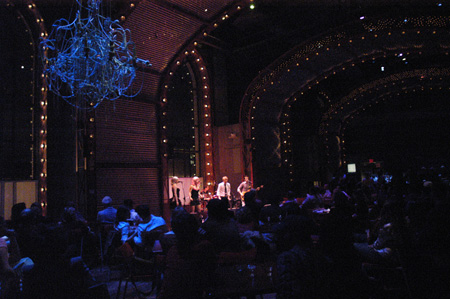
GO TO:
ARTIST NEWS
•
YOU
ARE ON A SPECIAL FEATURES PAGE
|
 |
|
©Rick
Alan Rice (RAR),
May, 2012
|
| 
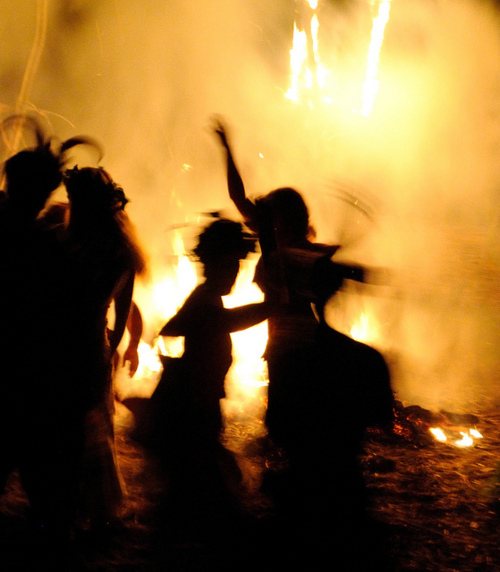
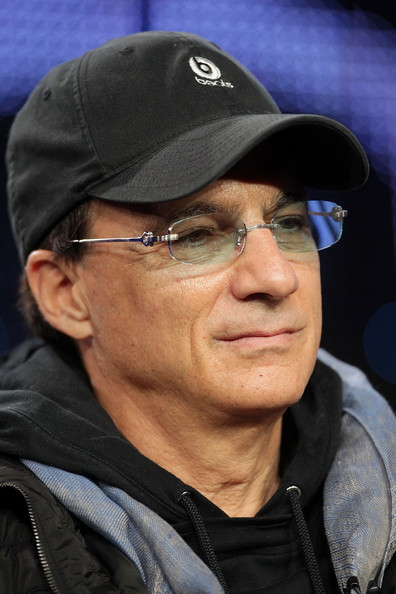 Learning
from Jimmy Iovine
Learning
from Jimmy Iovine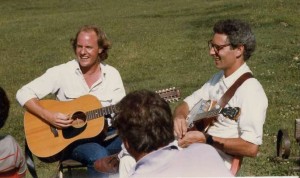
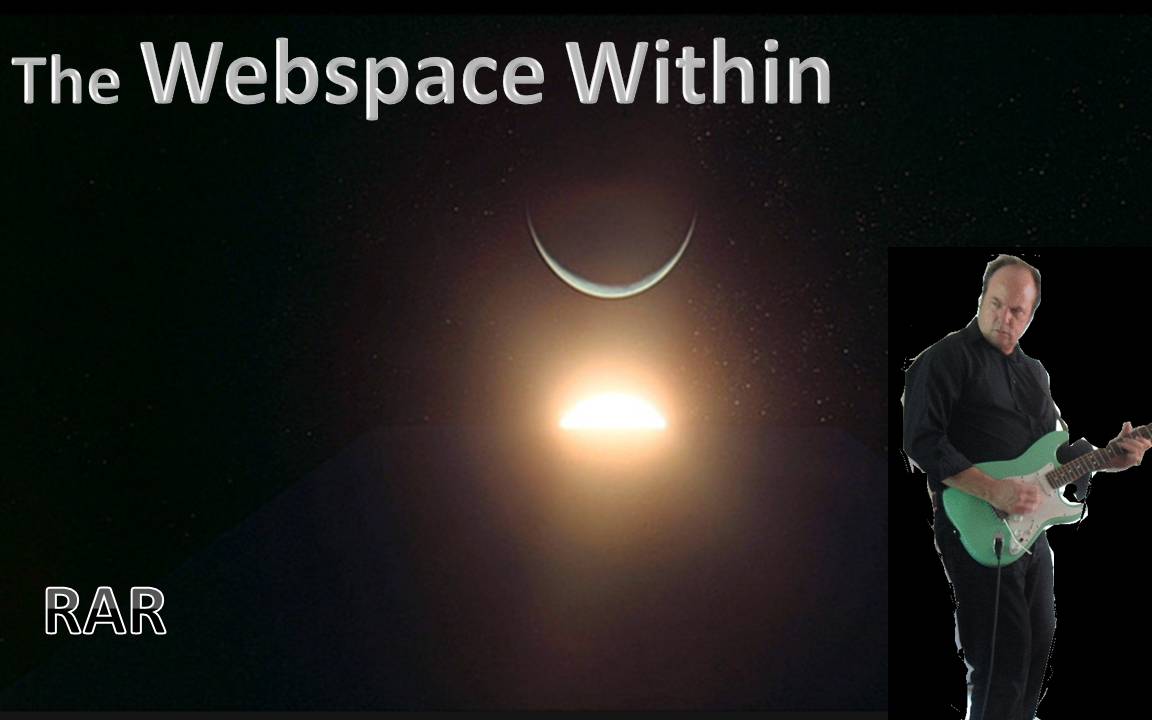



 The
Fabulous Entourage began as a collaboration between Travis Chamberlain
(bassist/vocalist in the band) and me. At first, it was just the two of us,
performing with a drum machine. Over time, we added a drummer (Perry Silver) and
female vocalists (the current lineup being Libby Winters and Pamela Quinn). At
the moment, we're on a six-month hiatus because Libby booked the leading role in
Mamma Mia in Las Vegas. We plan to reconvene after that, however. People can go
to our website at http://www.fabulousentourage.com to find out details on that.
The
Fabulous Entourage began as a collaboration between Travis Chamberlain
(bassist/vocalist in the band) and me. At first, it was just the two of us,
performing with a drum machine. Over time, we added a drummer (Perry Silver) and
female vocalists (the current lineup being Libby Winters and Pamela Quinn). At
the moment, we're on a six-month hiatus because Libby booked the leading role in
Mamma Mia in Las Vegas. We plan to reconvene after that, however. People can go
to our website at http://www.fabulousentourage.com to find out details on that.

 I've
written a rock musical called LOVE KILLS about 1950s teenage spree killers
Charlie Starkweather and Caril Fugate. It's going to premiere in NYC this
September, directed by Jason Southerland. I'm very excited about it and I hope
that anyone reading this in NYC will go check it out. (You can see more info
online at
I've
written a rock musical called LOVE KILLS about 1950s teenage spree killers
Charlie Starkweather and Caril Fugate. It's going to premiere in NYC this
September, directed by Jason Southerland. I'm very excited about it and I hope
that anyone reading this in NYC will go check it out. (You can see more info
online at 

